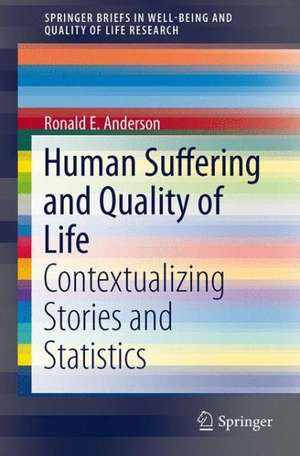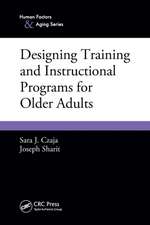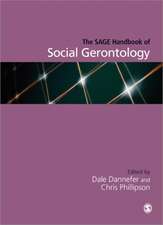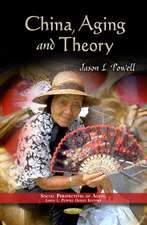Human Suffering and Quality of Life: Conceptualizing Stories and Statistics: SpringerBriefs in Well-Being and Quality of Life Research
Autor Ronald E. Andersonen Limba Engleză Paperback – 21 oct 2013
Din seria SpringerBriefs in Well-Being and Quality of Life Research
- 5%
 Preț: 252.59 lei
Preț: 252.59 lei -
 Preț: 277.91 lei
Preț: 277.91 lei - 5%
 Preț: 324.88 lei
Preț: 324.88 lei - 5%
 Preț: 422.13 lei
Preț: 422.13 lei -
 Preț: 410.01 lei
Preț: 410.01 lei - 5%
 Preț: 326.32 lei
Preț: 326.32 lei -
 Preț: 379.09 lei
Preț: 379.09 lei - 5%
 Preț: 358.48 lei
Preț: 358.48 lei - 5%
 Preț: 322.85 lei
Preț: 322.85 lei -
 Preț: 376.80 lei
Preț: 376.80 lei - 5%
 Preț: 357.23 lei
Preț: 357.23 lei - 5%
 Preț: 356.32 lei
Preț: 356.32 lei - 5%
 Preț: 356.67 lei
Preț: 356.67 lei - 5%
 Preț: 357.61 lei
Preț: 357.61 lei -
 Preț: 377.73 lei
Preț: 377.73 lei -
 Preț: 375.07 lei
Preț: 375.07 lei - 5%
 Preț: 329.66 lei
Preț: 329.66 lei - 5%
 Preț: 356.46 lei
Preț: 356.46 lei -
 Preț: 378.34 lei
Preț: 378.34 lei - 5%
 Preț: 358.48 lei
Preț: 358.48 lei - 5%
 Preț: 358.32 lei
Preț: 358.32 lei -
 Preț: 376.80 lei
Preț: 376.80 lei - 5%
 Preț: 421.92 lei
Preț: 421.92 lei -
 Preț: 379.30 lei
Preț: 379.30 lei -
 Preț: 378.71 lei
Preț: 378.71 lei -
 Preț: 375.45 lei
Preț: 375.45 lei - 5%
 Preț: 358.84 lei
Preț: 358.84 lei -
 Preț: 385.44 lei
Preț: 385.44 lei -
 Preț: 376.04 lei
Preț: 376.04 lei - 5%
 Preț: 364.85 lei
Preț: 364.85 lei -
 Preț: 355.07 lei
Preț: 355.07 lei -
 Preț: 357.86 lei
Preț: 357.86 lei -
 Preț: 411.54 lei
Preț: 411.54 lei - 5%
 Preț: 329.95 lei
Preț: 329.95 lei -
 Preț: 377.95 lei
Preț: 377.95 lei -
 Preț: 478.53 lei
Preț: 478.53 lei - 5%
 Preț: 357.77 lei
Preț: 357.77 lei - 5%
 Preț: 356.67 lei
Preț: 356.67 lei -
 Preț: 410.55 lei
Preț: 410.55 lei - 5%
 Preț: 362.16 lei
Preț: 362.16 lei - 5%
 Preț: 357.23 lei
Preț: 357.23 lei - 5%
 Preț: 357.97 lei
Preț: 357.97 lei - 5%
 Preț: 359.42 lei
Preț: 359.42 lei - 5%
 Preț: 358.84 lei
Preț: 358.84 lei -
 Preț: 442.02 lei
Preț: 442.02 lei -
 Preț: 378.54 lei
Preț: 378.54 lei
Preț: 410.94 lei
Nou
Puncte Express: 616
Preț estimativ în valută:
78.63€ • 82.11$ • 64.93£
78.63€ • 82.11$ • 64.93£
Carte tipărită la comandă
Livrare economică 15-29 aprilie
Preluare comenzi: 021 569.72.76
Specificații
ISBN-13: 9789400776685
ISBN-10: 9400776683
Pagini: 85
Ilustrații: IX, 105 p. 18 illus.
Dimensiuni: 155 x 235 x 12 mm
Greutate: 0.17 kg
Ediția:2014
Editura: SPRINGER NETHERLANDS
Colecția Springer
Seria SpringerBriefs in Well-Being and Quality of Life Research
Locul publicării:Dordrecht, Netherlands
ISBN-10: 9400776683
Pagini: 85
Ilustrații: IX, 105 p. 18 illus.
Dimensiuni: 155 x 235 x 12 mm
Greutate: 0.17 kg
Ediția:2014
Editura: SPRINGER NETHERLANDS
Colecția Springer
Seria SpringerBriefs in Well-Being and Quality of Life Research
Locul publicării:Dordrecht, Netherlands
Public țintă
ResearchCuprins
Preface.- Chapter 1. Conceptualizing Human Pain and Suffering.- Chapter 2. Narrative Accounts of the Agony of Suffering.- Chapter 3. Statistical Portrait of Suffering in America.- Chapter 4. Suffering on a Global Scale.- Chapter 5. World Suffering Expands as Gaps in Care Widen.- Chapter 6. Ending Preventable Suffering: Ethics and Social Change.- Index.
Recenzii
From the book reviews:
“Anderson’s work provides a wake-up call to those in quality of life research domains as well as a broader audience too – essentially anyone concerned with the plight of the human lot. … This book began with an ambitious goal of providing ways of thinking through the difficult and multi-dimensional issue of suffering experienced by humankind … .” (Rhonda Phillips, Applied Research Quality Life, Vol. 9, 2014)
“Anderson’s work provides a wake-up call to those in quality of life research domains as well as a broader audience too – essentially anyone concerned with the plight of the human lot. … This book began with an ambitious goal of providing ways of thinking through the difficult and multi-dimensional issue of suffering experienced by humankind … .” (Rhonda Phillips, Applied Research Quality Life, Vol. 9, 2014)
Notă biografică
Ronald (Ron) Anderson is Professor Emeritus at the University of Minnesota. He received his PhD in sociology from Stanford University in 1970. From 1968 until retiring in 2005, he served on the faculty of sociology at the University of Minnesota. Throughout that time, he consulted for many government agencies and corporations on survey research and technology-related issues. From 1990 to 2005, he coordinated several international studies of the social and learning effects of information technology within primary and secondary education in 20 or more countries in each study. From that and earlier work, he wrote or edited seven books and over 100 articles. Since retirement, his research interests have focused primarily on compassion and suffering. Further details on his work can be found in the following websites:
en.wikipedia.org/wiki/Ronald_Anderson
www.soc.umn.edu/~rea/
StopSuffering.net.
en.wikipedia.org/wiki/Ronald_Anderson
www.soc.umn.edu/~rea/
StopSuffering.net.
Textul de pe ultima copertă
This brief on human suffering adds to understanding of suffering by contextualizing both stories and statistics on pain and suffering, while showing that suffering adds a useful perspective to contemporary thought and research on quality of life, social well-being, and measures of societal progress. The scholarship on suffering is made more comprehensible in the book by using nine different conceptual frames that have been used for making sense of suffering. The primary focus of this work is with the last frame, the quality of life frame. Overall, these chapters show for the first time how the research on quality of life and well-being can be enhanced by embracing human suffering.
Caracteristici
The first book that integrates quality of life research and suffering Addresses suffering as both an individual burden and a global one Views suffering as a broad, serious phenomena that can be alleviated Integrates humanitarian and empirical traditions? Includes supplementary material: sn.pub/extras






